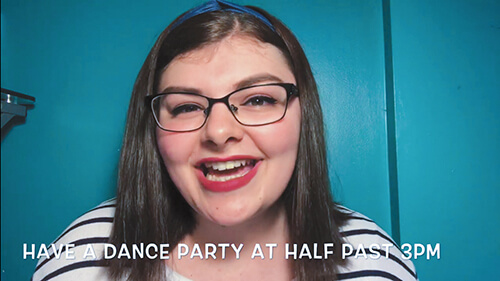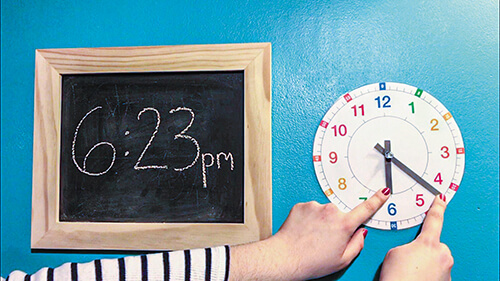In the midst of a pandemic, Messiah students helped kids with math
When Messiah classes moved to online after spring break, Carol Buckley, an associate math professor at Messiah, says she was overwhelmed by the amount of negativity posted on social media by parents at home trying to teach their children math. Recognizing the need to help the greater community, she put her students to work.
“I switched the final in my Math: Climate, Curriculum and Instruction II class,” said Buckley. “Instead of a paper/pencil assessment, they were charged with finding somebody who needed help in math and providing sustained virtual support.”
Teaching remotely
 One of the students, Kellie Drobenak ’21, an early childhood education major, worked with Sonya, a second-grader and granddaughter of Melinda Burchard, associate professor of special education at Messiah. Before getting started with lessons, however, Drobenak first consulted Sonya’s mom.
One of the students, Kellie Drobenak ’21, an early childhood education major, worked with Sonya, a second-grader and granddaughter of Melinda Burchard, associate professor of special education at Messiah. Before getting started with lessons, however, Drobenak first consulted Sonya’s mom.
“This really helped me improve my skills of communicating with parents,” said Drobenak. “In the school environment and online learning environment, that connection with the students’ parents are crucial for their success.”
Since Sonya was learning how to tell time, Drobenak created a mini-lesson using a clock via video.

“Then, to follow it up, I wrote and recorded a personalized activity for her: Help me figure out how to put my daily schedule onto an analog clock,” said Drobenak. “I even made sure to work in a brain break in the video, where we have a mini dance party!”
For elementary education major Sarah Haverstick ’21, she simply called a neighbor whose son she has babysat. The fourth-grader got to see his sitter in full teacher mode as she created worksheets for him.
“There were problems about his family, dog, soccer, basketball, lacrosse, baking and building,” she said. “To supplement these worksheets, I also sent his mom an answer key and a private personalized YouTube video for her son to watch.”
After zipping through the worksheets, the boy asked to learn algebra.
“Whoa. How was I going to teach a fourth-grader algebra?” she wondered. “I immediately thought back to a presentation I had given … about algebraic thinking and was flooded with ideas to help this student build these skills.”
She created three new worksheets and a YouTube video.
“I wanted him to see that algebra is all about being a detective to find missing numbers and kind of like a puzzle where you have to find the right piece.”
Playing remotely, too
From her home in New York, Karissa McIlrath ’21 reached out to her 8-year-old cousin, Eliana, in Illinois. McIlrath says Eliana is a good student but felt the pressures of being a second-grader learning remotely.
“Sometimes, the best way to offer online support is just being a listening ear and being present,” said McIlrath. “She was able to talk about her emotions, show me the crafts she's been making and read to me. My initial instinct was to try to get her back to the task at hand, but I quickly realized that this was the type of therapeutic interaction she needed, and I found it to help me, too.”
Adapting as students and future educators
Majoring in education with dual certification with preK-4 and special education, McIlrath says that, while the pandemic turned her junior year upside-down, she found herself fully prepared to learn and to teach remotely.
“Dr. Buckley has been equipping us for an assignment like this all school year,” she said. “Through every class I have had with her, she provides us with tools both physical and online that we can provide students to aid them with their math understanding.”
These Messiah students say they were grateful for the learning opportunity of this unique final exam and the glimpse into what teachers have been faced with during this pandemic.
Messiah profs going the extra mile
While the semester unfolded differently than anyone expected, students witnessed their professors quickly shift to online teaching, all the while showing their classes how much they cared.
“It’s definitely not easy nor something that any of us were prepared for,” said Drobenak, “but seeing them adapt, make mistakes but grow from them and make sure their students know how loved they are by going the extra mile has been so inspiring to see as a future educator. Seeing how the Messiah community has come together during this time has made me even more proud to be a Falcon."
— Anna Seip